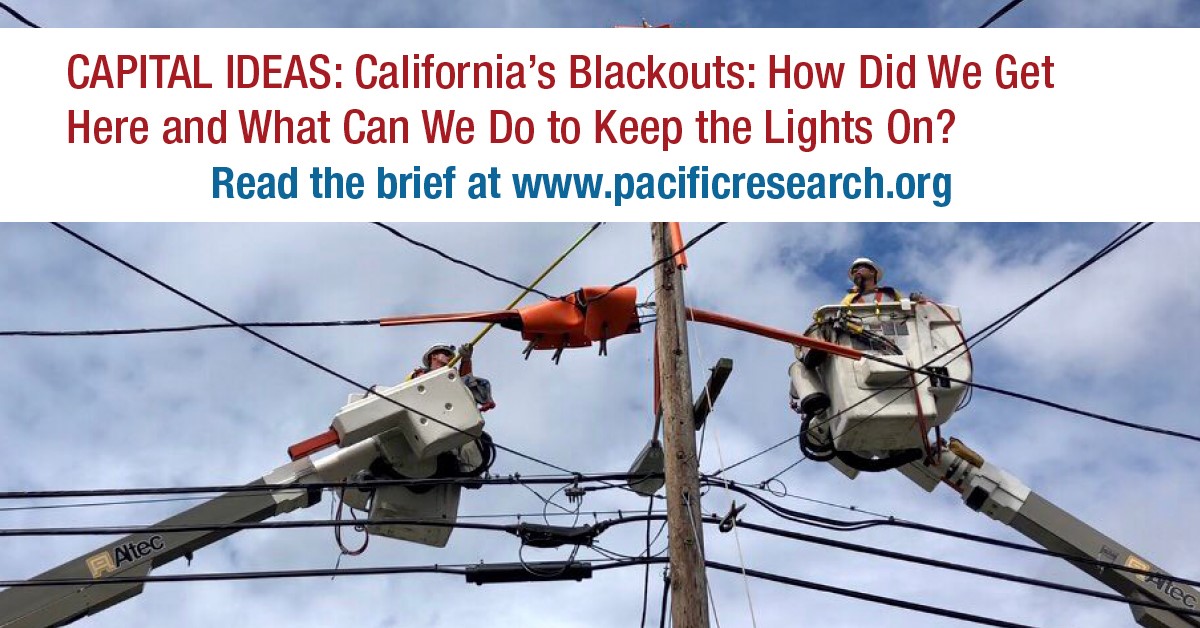Gov. Gavin Newsom announced last week that he was going to name an energy czar “in the wake of Pacific Gas and Electric Company’s prolonged power outages,” says the Sacramento Bee, because. According to the governor, “the entire system needs to be reimagined.”
“We cannot afford the kind of public safety power shutoffs we’ve experienced over the last week,” he said.
Ana Matosantos, Newsom’s cabinet secretary, was tapped for the job. She will keep her day job while still directing “the state’s efforts to fight wildfires, protect vulnerable Californians and ensure that going forward, Californians have safe, affordable, reliable, and clean power.”
Worthy goals, all, but they’re too much to ask even of a czar. Those objectives can be reached in California only through divine intervention, given this state’s political climate, dominated by a party bent on banning fossil fuels.
Nevertheless, Matosantos has her orders. So, let’s help her out.
Fighting wildfires. Only about 10% of California wildfires are started by the electrical utilities. Even if Matosantos ordered them all shuttered, the state would still burn as nature has intended. It would be helpful, though, if she could find a way to bypass the regulatory and activist roadblocks that stand in the way of clearing the dead trees and other fuels that feed wildfires. If Matosantos can advance appropriate forest management practices, her tenure will be off to a solid start.
Protecting vulnerable Californians. This one is a bit vague, though it makes a fine political slogan. She’s on her own, here.
Safe power. Deregulate. Providers operating in a free market have a strong incentive to deliver their products safely. Regulated utilities that have been granted a government-protected monopoly not so much.
Affordable power. Deregulate. Deregulate. Competition always drives prices down.
Reliable power. Deregulate. Deregulate. Deregulate. A government-protected monopoly has less incentive to reliably deliver its products than a provider operating in a competitive free market that knows it will lose customers if it doesn’t perform.
Clean power. Go back to the future on nuclear power. It’s as green as any renewable source and more reliable, since it doesn’t have to depend on sun or wind, or batteries, to generate electricity.
Rethinking California’s archaic system isn’t a difficult task. What works isn’t a secret. Even the most cockeyed observers know markets work, even if their politics don’t allow them to admit it aloud.
Nor would it be radical to correct the course. In Florida, a constitutional amendment that “requires the Legislature to adopt laws providing for competitive wholesale and retail markets for electricity generation and supply” will be on the ballot next fall.
A bit farther north, a “politically diverse coalition” made up “of several Virginia organizations of surprisingly varied political stances” has “come together to try and put an end to the monopoly Dominion Energy has on Virginia’s electrical supply.” The aim is to “create a competitive free market for energy” in the state.
Texas, which has become California’s most bitter rival, has already gone where those states are hoping to go. “Trust in a free market system has served us well,” says a recent Dallas Morning News editorial comparing the two state’s power systems.
“We urge Texans to continue to hold fast to their trust in our free market system, and don’t go monkeying with a good thing, adding socialized or highly regulated functions,” says the Morning News editorial board. “We need only look to California for an example of what not (emphasis added) to do.”
Implementing a reimagined system will of course find strong resistance in Democrat-dominated Sacramento. We wish Matosantos the best in her new job.
Kerry Jackson is a fellow with the Center for California Reform at the Pacific Research Institute.

